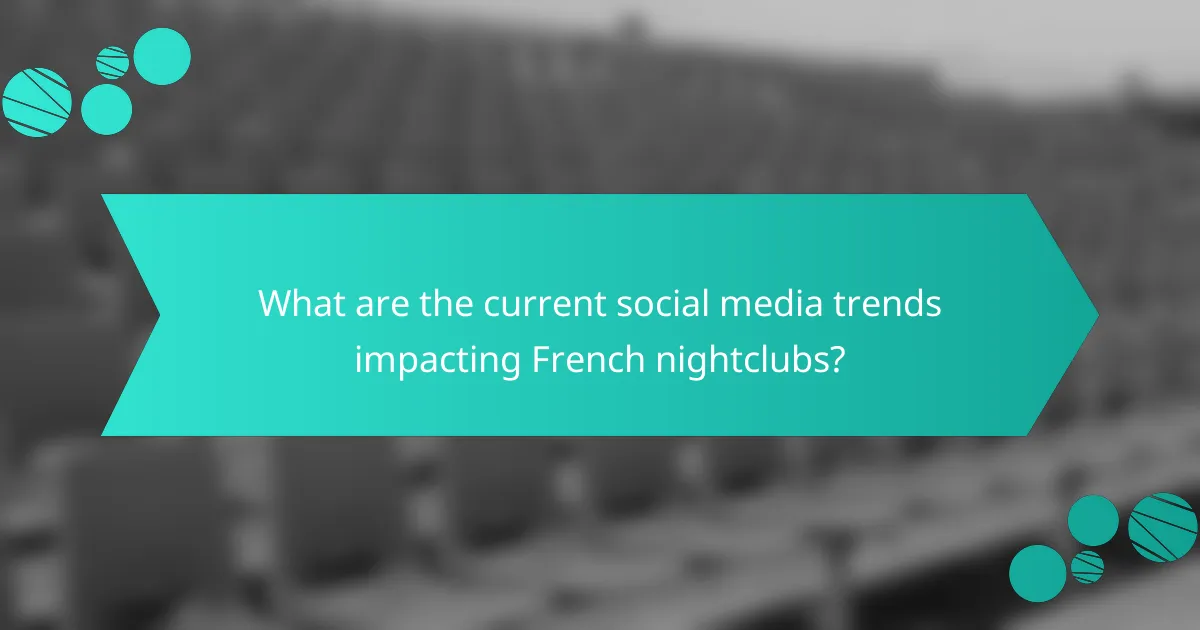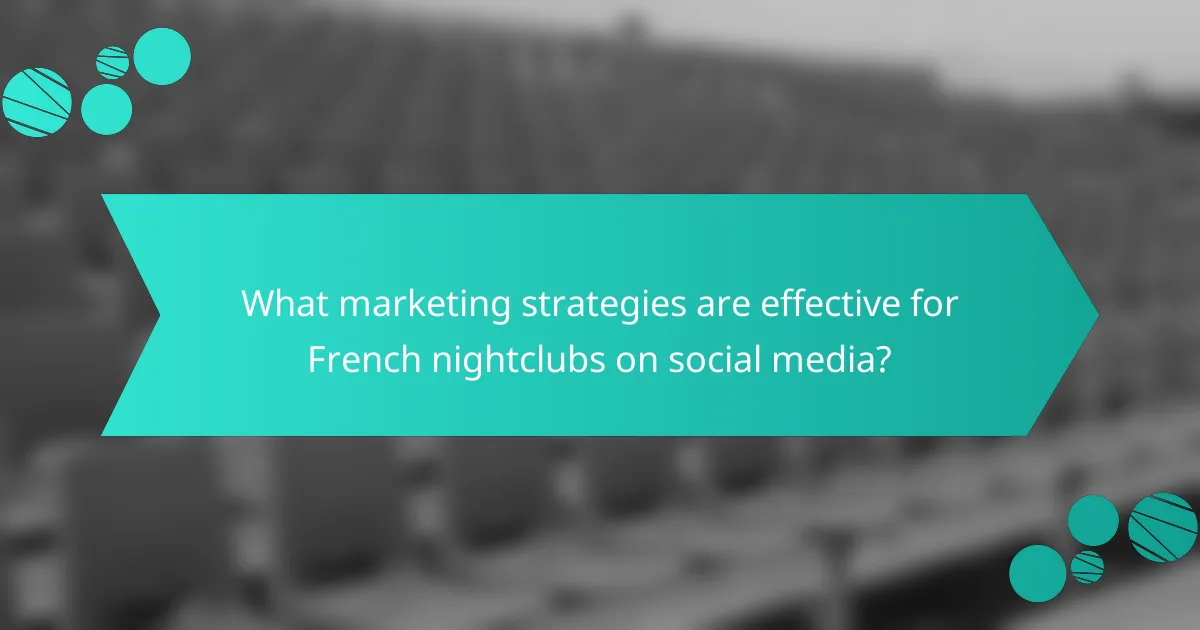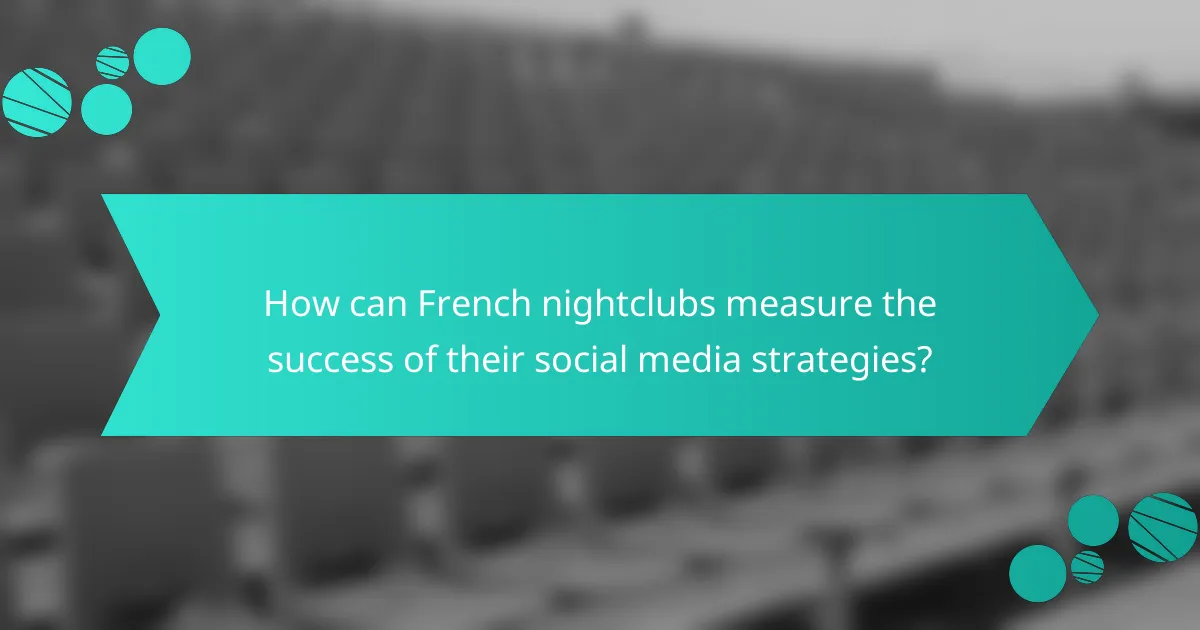The article focuses on social media trends and marketing strategies in French nightclubs. It highlights the growing influence of short-form video content on platforms like TikTok and Instagram Reels, emphasizing how nightclubs use these channels to promote events and engage with audiences. Key strategies discussed include influencer partnerships, user-generated content, and targeted advertising, which enhance visibility and attract diverse crowds. Additionally, the article outlines methods for measuring the success of social media efforts through key performance indicators such as engagement rates and conversion rates, providing insights into optimizing marketing strategies for improved performance.

What are the current social media trends impacting French nightclubs?
Current social media trends impacting French nightclubs include the rise of short-form video content, particularly on platforms like TikTok and Instagram Reels. Nightclubs are leveraging these platforms to showcase events, DJ performances, and the overall atmosphere. User-generated content is also gaining traction, as patrons share their experiences, enhancing the club’s visibility. Influencer partnerships are increasingly important, with nightclubs collaborating with local influencers to reach wider audiences. Real-time engagement through live streaming events is becoming popular, allowing clubs to connect with followers instantly. Additionally, themed events and promotions are frequently advertised on social media to attract diverse crowds. These trends indicate a shift towards interactive and visually-driven marketing strategies in the nightlife industry.
How are French nightclubs utilizing social media platforms?
French nightclubs utilize social media platforms for marketing and engagement. They create visually appealing content to attract potential customers. Many clubs post event promotions on Instagram and Facebook. They also share behind-the-scenes footage to build a connection with their audience. User-generated content is often showcased to enhance community involvement. Nightclubs engage with followers through interactive stories and polls. Social media advertising is used to target specific demographics effectively. According to a survey, 70% of nightlife venues report increased attendance due to social media marketing.
What platforms are most popular among French nightclubs?
French nightclubs primarily use Instagram, Facebook, and Snapchat for marketing and engagement. Instagram is favored for its visual appeal and ability to showcase events. Facebook serves as a platform for event promotion and community building. Snapchat is popular for real-time updates and engaging younger audiences. According to a 2022 survey, 78% of French nightclubs reported using Instagram as their main marketing tool. Additionally, 65% utilized Facebook for event announcements. These platforms facilitate direct interaction with patrons and enhance brand visibility.
How do different platforms cater to various audience segments?
Different platforms cater to various audience segments by tailoring content and features to specific demographics. For example, Instagram targets younger users with visually appealing content and Stories. Facebook, on the other hand, appeals to a broader age range with diverse content formats. TikTok engages Gen Z through short, entertaining videos that promote trends. LinkedIn focuses on professionals, offering networking opportunities and industry-related content. Each platform uses algorithms to prioritize content that resonates with its user base. This strategic approach enhances user engagement and retention. Studies show that targeted marketing increases conversion rates by up to 30%.
Why is social media essential for marketing in French nightclubs?
Social media is essential for marketing in French nightclubs because it allows for direct engagement with potential customers. Nightclubs can showcase events, promotions, and experiences through visually appealing content. Platforms like Instagram and Facebook enable targeted advertising to specific demographics. This targeted approach increases the likelihood of attracting the desired audience. According to a study by Statista, over 70% of young adults in France use social media regularly. This statistic highlights the importance of reaching this audience where they spend their time. Additionally, social media facilitates real-time communication and feedback from patrons. This interaction helps nightclubs improve their offerings and customer satisfaction.
What advantages does social media offer for nightclub marketing?
Social media offers several advantages for nightclub marketing. It enables direct engagement with potential customers. Nightclubs can share event promotions and special offers instantly. Social media platforms allow for targeted advertising to specific demographics. This can increase attendance and brand awareness. User-generated content enhances authenticity and attracts new patrons. Nightclubs can leverage influencer partnerships for broader reach. Analytics tools provide insights into customer preferences and behaviors. These insights help refine marketing strategies effectively.
How does social media influence customer engagement in nightclubs?
Social media significantly influences customer engagement in nightclubs by enhancing visibility and interaction. Nightclubs utilize platforms like Instagram and Facebook to showcase events and promotions. This exposure attracts potential customers and fosters a sense of community among patrons. Engaging content, such as live videos and user-generated posts, encourages audience participation. According to a study by the Journal of Marketing Research, 70% of consumers are influenced by social media interactions when deciding to visit nightlife venues. Additionally, social media allows nightclubs to receive real-time feedback, enabling them to adapt offerings to customer preferences. This dynamic interaction boosts customer loyalty and repeat visits.

What marketing strategies are effective for French nightclubs on social media?
Effective marketing strategies for French nightclubs on social media include influencer partnerships, engaging content, and targeted advertising. Influencer partnerships help reach a wider audience. Collaborating with local influencers can enhance credibility and attract followers. Engaging content, such as live videos and behind-the-scenes posts, fosters interaction. This approach keeps potential customers informed and entertained. Targeted advertising on platforms like Facebook and Instagram allows nightclubs to reach specific demographics. According to Statista, 54% of social media users utilize these platforms for discovering events. Utilizing these strategies can significantly increase visibility and attendance at events.
How can nightclubs create compelling content for social media?
Nightclubs can create compelling content for social media by showcasing vibrant nightlife experiences. They should capture high-quality images and videos of events, DJs, and patrons enjoying themselves. Engaging storytelling can connect with audiences emotionally. Live streaming performances can create real-time engagement and excitement. User-generated content from patrons can enhance authenticity and community. Special promotions and events should be highlighted to attract followers. Collaborating with influencers can expand reach and visibility. According to a 2022 study by Sprout Social, posts featuring videos receive 48% more engagement than static images, reinforcing the importance of dynamic content.
What types of content resonate most with nightclub audiences?
Nightclub audiences resonate most with visually engaging content, particularly high-quality videos and images. Live performances, DJ sets, and dance floor action capture attention effectively. User-generated content, such as tagged photos and videos from patrons, enhances community engagement. Promotional content featuring upcoming events and exclusive offers also attracts interest. Behind-the-scenes content, showcasing the nightlife experience, builds anticipation. Additionally, interactive content like polls and contests encourages audience participation. According to a study by Eventbrite, 78% of millennials prefer visual content over text, validating the effectiveness of this approach in nightclubs.
How can nightclubs leverage user-generated content for marketing?
Nightclubs can leverage user-generated content for marketing by encouraging patrons to share their experiences on social media. This can be achieved through specific campaigns that incentivize attendees to post photos and videos during events. For example, offering discounts or giveaways for posts tagged with the nightclub’s official hashtag can increase engagement.
Additionally, featuring user-generated content on the nightclub’s own social media channels enhances authenticity. Studies show that content created by users can increase trust among potential customers. According to a report by Nielson, 92% of consumers trust organic, user-generated content more than traditional advertising.
By showcasing real experiences, nightclubs can attract a wider audience and foster a community atmosphere. This strategy not only promotes the venue but also creates a sense of belonging among patrons.
What role do influencers play in nightclub marketing on social media?
Influencers play a crucial role in nightclub marketing on social media. They help increase brand visibility and reach targeted audiences. Influencers create engaging content that showcases the nightclub experience. Their followers often trust their recommendations, leading to higher attendance rates. Collaborations with influencers can include event promotions and exclusive access. This strategy leverages the influencer’s fanbase to attract new customers. Studies show that influencer marketing can yield a return on investment of up to 11 times. Nightclubs that utilize influencers often see increased engagement across their social media platforms.
How can nightclubs identify and collaborate with the right influencers?
Nightclubs can identify and collaborate with the right influencers by analyzing their audience engagement and relevance to the nightclub’s brand. They should evaluate influencers based on follower demographics, engagement rates, and content style. Tools like social media analytics can help assess these factors. Nightclubs should prioritize influencers who align with their target audience and brand values. Collaborating with local influencers can enhance community engagement and reach. Successful partnerships often include clear communication of goals and expectations. Research shows that influencer marketing can increase brand awareness by up to 11 times.
What are the potential risks and rewards of influencer partnerships?
Influencer partnerships can yield significant rewards and potential risks. The rewards include increased brand visibility and access to a wider audience. Collaborating with influencers can enhance credibility and foster trust among potential customers. For instance, brands often see a return on investment of $6.50 for every dollar spent on influencer marketing.
However, risks exist as well. Misalignment with the influencer’s values may damage brand reputation. Additionally, negative feedback from followers can spread quickly, impacting public perception. A study by the Digital Marketing Institute found that 60% of consumers distrust influencers who don’t disclose sponsorships. Thus, managing these partnerships requires careful consideration and strategy.

How can French nightclubs measure the success of their social media strategies?
French nightclubs can measure the success of their social media strategies through various metrics. Key performance indicators (KPIs) include engagement rates, follower growth, and conversion rates. Engagement rates reflect likes, shares, and comments on posts. Follower growth indicates the increase in audience size over time. Conversion rates measure the number of users who take desired actions, such as purchasing tickets or making reservations.
Additionally, tracking website traffic from social media can provide insights into user behavior. Tools like Google Analytics can quantify this traffic. Surveys and feedback from patrons can also gauge the effectiveness of social media campaigns. By analyzing these metrics, nightclubs can adjust their strategies to enhance performance.
What key performance indicators (KPIs) should nightclubs track?
Nightclubs should track several key performance indicators (KPIs) to measure success. These include customer attendance rates, which indicate the number of patrons visiting the venue. Revenue per event is crucial for understanding financial performance. Additionally, customer demographics provide insights into the audience’s age, gender, and preferences.
Social media engagement metrics reflect the effectiveness of marketing strategies. Customer feedback and reviews help assess satisfaction levels. Staff performance metrics can indicate operational efficiency. Lastly, drink and food sales per guest offer insights into profitability. Tracking these KPIs enables nightclubs to optimize their operations and marketing strategies effectively.
How do engagement metrics reflect marketing effectiveness?
Engagement metrics reflect marketing effectiveness by measuring audience interaction with content. High engagement indicates that the audience finds the content relevant and appealing. Metrics such as likes, shares, comments, and click-through rates provide insights into consumer behavior. For instance, a study by HubSpot found that posts with higher engagement rates lead to increased brand awareness and customer loyalty. Additionally, tracking these metrics helps marketers adjust strategies in real-time to optimize performance. This data-driven approach enhances overall marketing effectiveness by aligning content with audience preferences.
What tools can nightclubs use to analyze their social media performance?
Nightclubs can use tools like Hootsuite, Sprout Social, and Google Analytics to analyze their social media performance. Hootsuite allows for monitoring multiple social media platforms in one place. It offers analytics on post engagement and audience growth. Sprout Social provides in-depth reporting on social media metrics and audience demographics. Google Analytics tracks traffic from social media to the nightclub’s website. This data helps nightclubs understand their online presence and audience interactions.
What best practices should nightclubs follow for social media marketing?
Nightclubs should prioritize engaging content and consistent posting on social media. High-quality visuals and videos showcasing events attract more followers. Utilizing stories and live streams can create real-time engagement with audiences. Collaborating with local influencers can expand reach and credibility. Promoting exclusive offers and events encourages followers to interact. Analyzing performance metrics helps refine strategies for better engagement. Responding promptly to comments and messages builds community and loyalty. Lastly, maintaining brand consistency across platforms strengthens recognition and trust.
How can nightclubs adapt their strategies based on audience feedback?
Nightclubs can adapt their strategies based on audience feedback by actively collecting and analyzing data from patrons. Feedback can be gathered through surveys, social media interactions, and direct communication during events. This information helps identify popular music genres, preferred drink options, and desired event themes.
For instance, if patrons express a preference for electronic music, nightclubs can adjust their lineups accordingly. Additionally, if feedback indicates dissatisfaction with drink prices, nightclubs might consider promotional offers or happy hours.
Implementing changes based on audience feedback can lead to increased customer satisfaction and loyalty. According to a study by the Journal of Hospitality Marketing & Management, venues that actively engage with customer feedback see a 20% increase in repeat visits. This demonstrates the effectiveness of adapting strategies to meet audience expectations.
What are common pitfalls to avoid in social media marketing for nightclubs?
Common pitfalls to avoid in social media marketing for nightclubs include inconsistent branding. Nightclubs should maintain a cohesive visual and messaging strategy across all platforms. Failing to engage with followers can lead to decreased interest. Nightclubs must respond to comments and messages promptly. Overposting can overwhelm audiences, resulting in unfollows. A balanced posting schedule is essential for maintaining interest. Ignoring analytics can hinder growth. Nightclubs should regularly review engagement metrics to refine strategies. Lastly, targeting the wrong audience can waste resources. Nightclubs need to understand their demographic to tailor content effectively.
The main entity of this article is social media trends and marketing strategies in French nightclubs. The article examines the current impact of social media on the nightlife industry, highlighting trends such as short-form video content, user-generated content, and influencer partnerships. It details how nightclubs utilize platforms like Instagram, Facebook, and Snapchat for marketing, audience engagement, and event promotion. Additionally, the article discusses effective marketing strategies, the role of influencers, and the importance of measuring success through key performance indicators. Common pitfalls in social media marketing for nightclubs are also addressed, providing a comprehensive overview of best practices for enhancing visibility and customer engagement.